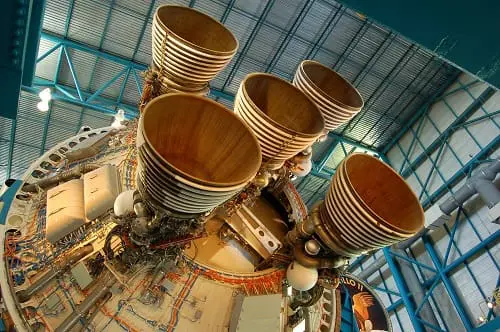
Space and small business – the final frontier. There practically isn’t a person alive today who doesn’t know this famous opening line from the original Star Trek series. When first uttered on American televisions in September 1966, space seemed like a faraway, exotic place full of wonder and excitement. But could it also be a place for small business?
If you had asked viewers back then where they thought the U.S. would be in 50 years as far as space exploration and exploitation, many no doubt would have given answers straight from a science fiction book. Well, now we are more than 50 years since Star Trek’s debut. Where are we in terms of utilizing space, particularly when it comes to small businesses?
Space and Small Business
First off, America has explored the outer reaches of the Solar System with unmanned probes. These probes have transmitted stunning pictures of each of the gas giants as well as given us close-up glimpses of Pluto and Saturn’s intriguing moon, Titan. However, manned spaceflight seems to have stood still. Yes, we’ve had an orbiting International Space Station (ISS) for more than 20 years, but we never reached Mars or even returned to the Moon. NASA hasn’t had a manned spaceflight launch since 2011 – U.S. astronauts have to hitch a ride to the ISS on other countries’ rockets.
In the 1960s and early 70s, critics charged NASA with wasting billions on space that could have been better spent on Earth. NASA pointed out all the innovations developed for space flight that have been adapted for use by and for the benefit of ordinary people. In contrast, in recent years, NASA has seemed to dissipate like a comet’s tail in the solar wind, seldom appearing in the headlines. And civilians’ interest in space has also apparently waned.
Does that mean America has essentially dropped out of the space race?
Not at all. The focus has merely shifted away from big-budget government programs like Apollo and the ISS. NASA is still trying to develop rockets and manned spacecraft, but much of its energy is devoted to smaller, more budget-friendly unmanned missions, to explore outer space as well as our Earth.
Not only have America’s space priorities changed, but the players in orbit are now different as well.
In the 1960s, reaching space was so monumentally expensive it was believed only a national government had the resources to get there. Private enterprise simply didn’t have the money, the tools or the wherewithal to put up a satellite, let alone a manned mission. Not that it really mattered… privatized space travel was illegal up to 2004!
In the late 2010s, that is simply no longer the case. Private space travel is now not only legal, it’s even being encouraged. Why? Because many policymakers now believe government’s role is space is to do those things the free market can’t support but that are still beneficial. All other opportunities are open for the private sector.
As a result, rather than government-funded agencies pushing the envelope, it’s private enterprise making headlines. Space entrepreneurs are now proposing all sorts of grandiose plans to make commercial use of space. These ideas range from space hotels, to privately sponsored trips to the Moon and Mars, to industrial space-based manufacturing.
As recently as June 2018, NASA and the Trump Administration floated the idea of privatizing at least a portion of the ISS. Part of the rationale is to cut maintenance and upkeep costs to the federal space agency. However, privatization would also help push the commercialization of space by providing a ready-made private sector experimental and manufacturing base without the startup costs.
So where does small business fit in with the privatization and commercialization of the final frontier? Elon Musk and SpaceX have shown private companies can launch their own spacecraft and carve out a nice existence doing for NASA what NASA used to do for itself. Still, mom-and-pop rocket companies are probably decades in the future. But there are places where small business can get a slice of the Moon’s green cheese today.
Space manufacturing has come a long way in a very short time. Microgravity environments are ideal for making many types of materials, such as crystals and pharmaceuticals. NASA recently has selected more than 100 ideas submitted by businesses to develop technologies and pursue research in space as part of its Small Business Innovation Research (SBIR) program. Should the ISS be privatized in whole or part, that initiative could grow exponentially.
However, taking advantage of space commerce doesn’t mean a small company actually has to go into space. More and more government programs are becoming increasingly privatized. And more large companies are seeking partners to help defray costs. This opens many opportunities to supply products and services to NASA and private companies involved in space commercialization.
This is not limited to high tech. For example, a small business that supplies offshore oil and gas companies, platforms and rigs might not have that hard a time transitioning to supplying materials, products and services for a space company. Oil & gas platforms and space stations, after all, are hazardous environments.
Ready to rocket off to the final frontier for fun and profit? The U.S. government has established an office to help companies explore doing business in space. The futuristic-sounding Office of Space Commerce could be your ticket to the stars… and profits.
- What Is An Invoice Factoring Broker? - July 17, 2022
- 7 Tips for Buying Out a Business Partner or Majority Owner - May 13, 2022
- 6 Leadership Secrets Every Small Business Owner Should Know - December 9, 2021

